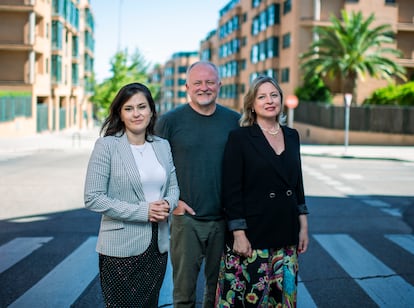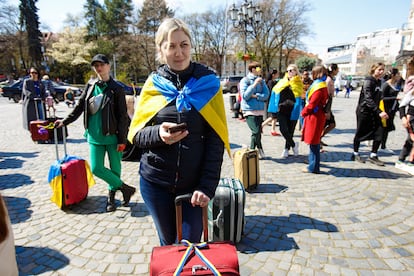Ukraine’s great scientific project advances in the only city that is safe from bombs
Dozens of doctors and scientists are creating the country’s largest genetic database in record time in Uzhhorod

Ukrainian biologist Taras Oleksyk gets emotional remembering what one of his country’s snipers once told him. “If you come to the trenches, who am I going to fight for? Stay. I know how to kill people, but not to educate them. You do.”
Sitting before a glass of mineral water and a plate of ham croquettes on a roof in Madrid, Oleksyk sums up all that he has been doing since the beginning of the Russian invasion; how he sent part of his paycheck to Ukraine, raised thousands of dollars to buy signal jammers against kamikaze drones. Above all, how he taught courses for young scientists who don’t want to or cannot leave their country, given that men from 18 to 60 years old are legally required to stay. The idea is to keep the call to research alive and not to lose an entire generation of scientists. “If we don’t plant the seeds, when the war ends and we have to reconstruct the country, we’ll already be behind,” says the evolutionary and genetic biologist, who works at Oakland University in Rochester Hills, Michigan, where is married and has two children.
The researcher is at the head of the creation of Ukraine’s largest genetic database, which until now was a “a blank space on the map” in the field. The goal is to collect DNA samples from 20,000 Ukrainians, all harvested during the war. It will serve, for example, for the study genetic conditions of type one diabetes, a chronic disease of unknown causes that affects the pancreas, cause damage to other organs and even lead to death. The project has already amassed the DNA of 10,000 people, thanks to a collaboration with 80 doctors throughout the country, including some who work close to the war’s front lines, and who take samples every time patients come to them seeking medical attention and insulin treatment. “It’s the country’s largest collection of samples of type one diabetes, DNA and complete genomes, and as far as we know, one of the largest in the world,” says Oleksyk. The scientist was visiting Madrid along with his colleagues Olga Oleksyk and Khrystyna Shchubelka in search of new collaborators at the annual meeting of the European Association for the Study of Diabetes.
Olga is Taras’s sister, an endocrinologist, legislator and health ambassador from Ukraine’s southwestern region of Transcarpathia. “In Ukraine, we have 25,000 amputees, not just soldiers, also many civilians, including children. We need support from Europe to obtain protheses and also, rehabilitation training for our doctors,” she explains. Her husband is a former history professor who is now fighting in the war. The number of wounded and of soldiers and civilians affected by post-traumatic stress disorder is overwhelming the region’s abilities, she says.
The capital of Transcarpathia is Uzhhorod. Separated from the rest of the country by the Carpathian mountains, it is the only Ukrainian city that has yet to be bombed by a single Russian missile, and has never been invaded. It is a few miles from the border with Slovakia and Hungary. Getting there is relatively safe and easy, just a few hours in taxi from Budapest.
Its island of peace amid such horror has attracted thousands of refugees. The city’s hospitals, which receive many wounded combatants, are overburdened. At the same time, the National University of Uzhhorod has become one of the country’s most active and is driving a large part of the research that is still underway, including the new genetic database and in-person bioinformatic courses.

When the war began, Khrystyna Shchubelka, a doctor who specializes in clinical genetics, left Uzhhorod with her husband and six-month-old son and moved to the United States. Nowadays, she spends time in both places. The scientist describes the strange environment in which Ukrainians live. “It’s a time of extremes. You see people totally destroyed at the funeral of their family member, while the rest of the time they try to live a normal life because if they don’t, they’ll go crazy.”
Ukraine’s new DNA bank will help to understand why some diabetics suffer kidney damage while others do not. It will also explain why cases have shot up in Ukraine. “We know from Israeli data that every time a conflict gets worse, there is an instantaneous spike. This disease impacts the autoimmune system. Stress also affects the immune system, and who suffers more stress than someone who is afraid of dying?” says Shchubelka.
More than 20 scientists from nine countries participate in the bioinformatics courses for young people that are taught in-person in Uzhhorod. The project’s creator is Fyodor Kondrashov, an expert on genetic evolution who was born in the former U.S.S.R., near Moscow, grew up in the United States and spent 10 years working in Spain at the Barcelona Center for Genomic Regulation (CRG). “The philosophy is to incubate a new generation of computational biologists who can create something for themselves tomorrow,” he explained to EL PAÍS by video call. It works in the project’s favor that learning this discipline doesn’t require expensive labs and hardly any computers and teachers, though this year, power outages and air-raid alarms have complicated things. “We usually make the joke that in Ukraine, we can do bioinformatics without electricity,” says Kondrashov, but “the truth is that Starlink [satellite internet] and gasoline generators help us a lot.”
CRG statistician and molecular biologist Roderic Guigó has participated in these two-week courses since the beginning, in 2023. 80 young people from throughout Ukraine attend free of charge, including some students from the cities that have borne most of the war’s brutality, like Kharkiv and Dnipro. “For a few days they can not only learn, but also get together and go out at night without fear of dying in a bombing,” says Guigó. His son Guillem, a University of Girona machine learning researcher, also teaches classes.
Taras Oleksyk trusts that the new DNA bank will hit its goal of collecting 20,000 samples by 2026, and that it will help Ukrainian bioinformatics scientists to carry out their own studies and collaborate with scientists in other countries. “On one hand, we tell our young people and doctors that the world needs them, and on the other, we show the world that we are ready to do first-class science,” he says.
Sign up for our weekly newsletter to get more English-language news coverage from EL PAÍS USA Edition
Tu suscripción se está usando en otro dispositivo
¿Quieres añadir otro usuario a tu suscripción?
Si continúas leyendo en este dispositivo, no se podrá leer en el otro.
FlechaTu suscripción se está usando en otro dispositivo y solo puedes acceder a EL PAÍS desde un dispositivo a la vez.
Si quieres compartir tu cuenta, cambia tu suscripción a la modalidad Premium, así podrás añadir otro usuario. Cada uno accederá con su propia cuenta de email, lo que os permitirá personalizar vuestra experiencia en EL PAÍS.
¿Tienes una suscripción de empresa? Accede aquí para contratar más cuentas.
En el caso de no saber quién está usando tu cuenta, te recomendamos cambiar tu contraseña aquí.
Si decides continuar compartiendo tu cuenta, este mensaje se mostrará en tu dispositivo y en el de la otra persona que está usando tu cuenta de forma indefinida, afectando a tu experiencia de lectura. Puedes consultar aquí los términos y condiciones de la suscripción digital.









































